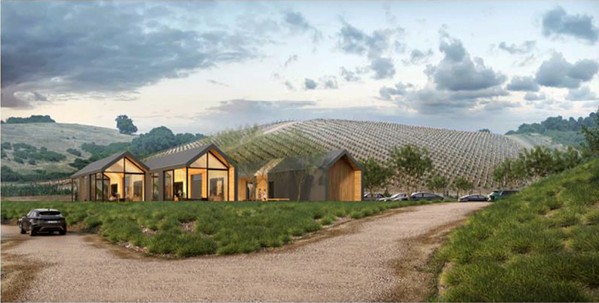[{
"name": "Ad - Medium Rectangle CC01 - 300x250",
"id": "AdMediumRectangleCC01300x250",
"class": "inlineCenter",
"insertPoint": "8",
"component": "2963441",
"requiredCountToDisplay": "12"
},{
"name": "Ad - Medium Rectangle LC01 - 300x250",
"id": "AdMediumRectangleCC01300x250",
"class": "inlineCenter",
"insertPoint": "18",
"component": "2963441",
"requiredCountToDisplay": "22"
},{
"name": "Ad - Medium Rectangle LC09 - 300x250",
"id": "AdMediumRectangleLC09300x250",
"class": "inlineCenter",
"insertPoint": "28",
"component": "3252660",
"requiredCountToDisplay": "32"
}]
A small Niderer Road winery near Paso Robles is gearing up to fashion a 27,000-square-foot facility complete with an underground cave system, much to the dismay of 30 neighbors.
In a 5-0 vote on April 9, the San Luis Obispo County Board of Supervisors shot down an appeal of a Feb. 8 Planning Commission decision to approve Clos Solène Winery's request for a conditional use permit. The permit allowed for the phased development of a large facility and a 19,000-square-foot underground cave that would increase its production from the current annual 5,000 cases to a proposed limit of 10,000 cases in a year.
"I think more people have to realize that there is a potential abusive situation here, that big money is coming into North County and they're pushing through into purchasing small businesses," appellant Larry Stone told New Times prior to the vote. "The powers that decide these things kind of give in."
Ten-year Niderer Road resident Stone appealed the Planning Commission's 3-0 vote with 2nd District Commissioner Anne Wyatt and 3rd District Commissioner Kristina Simpson-Spearman absent. He laid out a list of 16 grievances with the project—the largest number of appellant concerns reportedly observed by 1st District Supervisor John Peschong.
"I don't believe there is going to be incidents of public safety on this," Peschong said. "I have driven those roads many, many times, ... we got the road paved and that cleaned up a lot of the problems."
Stone, along with a handful of his neighbors, alleged that the winery development stands to increase traffic congestion on the county-owned road, create more noise from outdoor processing, and draw from a dwindling water supply, among other complaints. They also claimed that the setback modifications stemming from the proposed project adversely affect farmland.
While project detractors included the Templeton Area Advisory Group, which unanimously voted to recommend denying the project, it drew a bevy of supporters, primarily other winemakers.
Clos Solène's plans for expansion has been active for years. Their consultant and appeal hearing representative Jamie Jones of Kirk Consulting told New Times on April 10 that owners Guillaume and Solène Fabre have openly communicated with their neighbors since 2017 when they purchased the property.
"Our first official outreach to the neighbors for the project was in October of 2020," Jones said. "Due to COVID-19 restrictions, we hosted individual meetings with the neighbors to share the winery plans with them."
While the winery submitted the permit application in 2021, the pandemic, extra work to complete resource studies, and updating the mitigated negative declaration delayed the process.
County staff refuted Stone's complaints, repeatedly citing a lack of valid expert corroboration.
The staff report found that Niderer Road is wide enough for two vehicles to pass in opposite directions. A roadway safety analysis also didn't find safety problems with the winery expansion project. Staff dismissed the issue of water availability, adding the groundwater study in the Adelaida area isn't complete and there is no substantial evidence of water shortage within that region.
The Fabres added new voluntary restrictions to the project during the hearing "in direct response to neighbor input," Jones told New Times. These included admitting tasting room visitors by appointment only and limiting winery production. The owners banned outdoor amplified music too and called for activities to conclude at 10 p.m.
"The addition of the two conditions at the hearing, including a limitation on marketing activities and an annual reporting requirement, was another good faith effort by the Fabres to address the 'what if' fears expressed by the handful of neighbors that appealed the project," Jones said.
Stone told the supervisors that the neighbors will need more time to review the Fabres' new conditions since they were only added during the hearing.
"It's better than nothing," he told New Times. "The next step would be to take it to court if we decide to do that." Δ
Latest in News
Readers also liked…
-

Coast Unified teachers upset over new position's salary and qualifications
Oct 20, 2022 -

SLO police identify alleged driver who hit and killed couple
Dec 22, 2022 -

When the levee breaks: Oceano residents, county officials walk a tightrope of regulations to manage Arroyo Grande Creek, which some say led to the levee's failure in January
May 18, 2023










